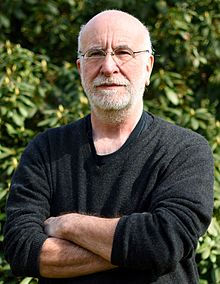Jürgen Brosius
Jürgen Brosius (* 1948 in Saarbrücken ) is a German molecular geneticist and evolutionary biologist . He teaches at the Westphalian Wilhelms University in Münster , where he heads the Institute for Experimental Pathology.
Life
Jürgen Brosius researched and taught at the University of California, Santa Cruz as a postdoctoral fellow in the laboratory of Harry Noller and at Harvard University as a postdoctoral fellow in the laboratory of Nobel Prize winner Walter Gilbert . From 1982 to 1988 he was a professor at Columbia University in Manhattan in the Center for Neurobiology & Behavior . He then went to the Fishberg Research Center for Neurobiology at the Mount Sinai School of Medicine in New York. Since 1994 he has headed the Institute for Experimental Pathology at the University of Münster and researches RNAs , retroposition and their role in the evolution of genes and genomes . Since 2015 he has also been a visiting professor at the newly founded private university Brandenburg Medical School Theodor Fontane .
In California, he pioneered the sequence of a ribosomal RNA operon including the 16S rRNA and 23S rRNA, and in the 1980s he began to usher in the era of RNomics. His research findings in the area of the conversion of RNA to DNA with simultaneous integration into the genome ( retroposition ) and its importance for the plasticity of genomes go back to him. In collaboration with Stephen Jay Gould , he has published a nomenclature ( On "genomenclature": a comprehensive (and respectful) taxonomy for pseudogenes and other "junk DNA" ) that allows for a better understanding of the function of retroposons ( retronuons ) and their meaning provide for the recruitment or exaptation of functional genomic modules.
Web links
- Institute for Experimental Pathology. Center for Molecular Biology of Inflammation (ZMBE), accessed April 1, 2015 .
Individual evidence
- ↑ J. Brosius, TJ Dull et al. a .: Gene organization and primary structure of a ribosomal RNA operon from Escherichia coli. In: Journal of molecular biology. Volume 148, Number 2, May 1981, pp. 107-127, PMID 7028991 .
- ↑ TM DeChiara, J. Brosius: Neural BC1 RNA: cDNA clones reveal nonrepetitive sequence content. In: Proceedings of the National Academy of Sciences . Volume 84, Number 9, May 1987, pp. 2624-2628, PMID 2437583 , PMC 304710 (free full text).
- ↑ W. Filipowicz: Imprinted expression of small nucleolar RNAs in brain: time for RNomics. In: Proceedings of the National Academy of Sciences . Volume 97, number 26, December 2000, pp. 14035-14037, doi : 10.1073 / pnas.97.26.14035 , PMID 11121012 , PMC 34092 (free full text) (review).
- ↑ A. Hüttenhofer, M. Kiefmann u. a .: RNomics: an experimental approach that identifies 201 candidates for novel, small, non-messenger RNAs in mouse. In: The EMBO Journal . Volume 20, number 11, June 2001, pp. 2943-2953, doi : 10.1093 / emboj / 20.11.2943 , PMID 11387227 , PMC 125495 (free full text).
- ↑ J. Brosius: Retroposons - seeds of evolution. In: Science . Volume 251, Number 4995, February 1991, p. 753, PMID 1990437 (review).
- ↑ J. Brosius, SJ Gould: On "genomenclature": a comprehensive (and respectful) taxonomy for pseudogenes and other "junk DNA". In: Proceedings of the National Academy of Sciences . Volume 89, Number 22, November 1992, pp. 10706-10710, PMID 1279691 , PMC 50410 (free full text).
- ↑ J. Brosius: RNAs from all categories generate retrosequences that may be exapted as novel genes or regulatory elements. In: Genes. 238, 1999, pp. 115-134, doi : 10.1016 / S0378-1119 (99) 00227-9 .
- ^ J. Brosius: The fragmented gene. In: Annals of the New York Academy of Sciences. Volume 1178, October 2009, pp. 186-193, doi : 10.1111 / j.1749-6632.2009.05004.x , PMID 19845638 (review).
- ↑ J. Brosius: The persistent contributions of RNA to eukaryotic gen (om) e architecture and cellular function. In: Cold Spring Harbor perspectives in biology. Volume 6, number 12, July 2014, p. A016089, doi : 10.1101 / cshperspect.a016089 , PMID 25081515 , PMC 4292154 (free full text) (review).
- ↑ genome.cshlp.org
| personal data | |
|---|---|
| SURNAME | Brosius, Jürgen |
| BRIEF DESCRIPTION | German molecular geneticist and evolutionary biologist |
| DATE OF BIRTH | 1948 |
| PLACE OF BIRTH | Saarbrücken |
